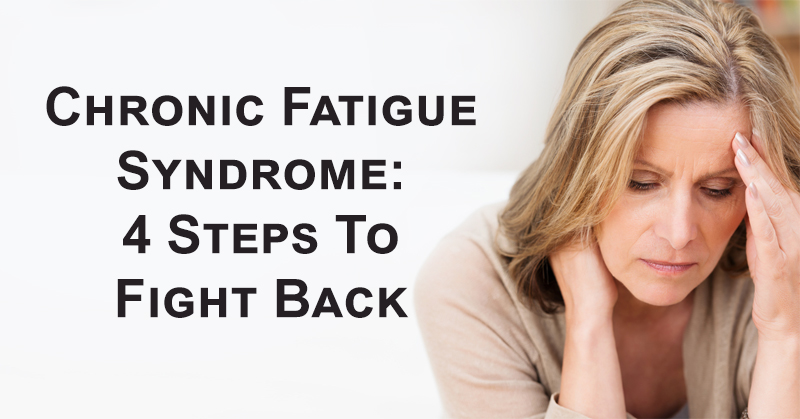Chronic fatigue syndrome causes, predominantly, extreme fatigue. Enlarged lymph nodes and unexplained joint pain are also chronic fatigue syndrome symptoms. Additionally, chronic fatigue syndrome causes headaches, and symptoms may also include difficulty concentrating. Some people see chronic fatigue syndrome symptoms such as extreme exhaustion after exercising.
Finding a good chronic fatigue syndrome treatment plan can be challenging. As it isn’t tied to any underlying condition, chronic fatigue syndrome causes are unknown. (1) Chronic fatigue syndrome symptoms can be debilitating. But you can combat them with a chronic fatigue syndrome diet. Eliminating items that worsen symptoms should be part of a chronic fatigue syndrome treatment plan. A chronic fatigue syndrome diet, for example, involves ridding of food sensitivities. Avoiding stimulants should also be part of a chronic fatigue syndrome treatment plan. To learn more about a chronic fatigue syndrome treatment plan, including a chronic fatigue syndrome diet, read below.
Here are 4 steps to help you fight back against chronic fatigue syndrome:
Step 1: Eliminate Food Sensitivities and Allergens

While some foods may seem to comfort you when you’re tired, getting rid of them might be what actually helps you get better. In fact, research points to a link between food allergies/sensitivities and chronic fatigue syndrome. Allergies to certain foods, pollen, and metals, for example, may be causing the rising number of individuals with CFS. (2)
There may also be a link between IBS, fibromyalgia, and chronic fatigue. In a study, 84 patients had “unexplained digestive problems.” Nearly all of them were diagnoses with IBS. Eighty-five perfect had CFS and 71 percent had fibromyalgia. The common link, researchers in this study believe, is poor digestion and food sensitivities. (3)
You may want to take a test at your doctor’s office to determine what food allergies you may have. Gluten is a common one, for example. Others include tree nuts, peanuts, dairy, soy, shellfish and yeast.
Be sure to get checked for a candida imbalance, as well.
Some research shows that those who follow an anti-candida diet experience a reduction in their symptoms related to chronic fatigue syndrome. (4)
Therefore, it might be in your best interest to try a candida diet. This includes probiotics, such as kefir, yogurt, sauerkraut and kimchi. Include plenty of green vegetables, flax and chia seeds, and unsweetened cranberry juice. Furthermore, eliminate from your diet sugar, alcohol and grains.
Treat H. pylori
Additionally, bacteria called H. pylori may be a contributing factor. In fact, they are common in nearly two-thirds of the world’s population. (5)
Researchers found that once H. pylori was out of the body of study participants, their physical and psychological symptoms, including those from IBS, fibromyalgia and chronic fatigue, got well. (6)
Step 2: Increase Your Vitamin B Intake

In one study, researchers found a direct link between reduced vitamin B levels and chronic fatigue syndrome. (7)
The study focused on B-6, riboflavin and thiamine. Researchers believe that B-6 is particularly crucial. Vitamin B-6 rich foods include bananas, sweet potatoes, hazelnuts, garlic and cooked spinach.
Methylation and B 12
Methylation is an important process in your body. It lends itself to healthy immune function, energy production, mood, inflammation, and nerve function. And all of these are challenges in chronic fatigue syndrome patients.
Vitamin B6 and B12 are needed in order for your body to methylate. (8) And vitamin B-12 can boost energy, reduce depression, and prevent against neurological degeneration. (9)
Therefore, in order to treat chronic fatigue syndrome effectively, incorporate B vitamins into your supplement intake.
Step 3: Increase Potassium and Magnesium Intake

Research shows that both potassium and magnesium can help improve chronic fatigue symptoms.
Magnesium
In one study, chronic fatigue syndrome patients were found to have low magnesium levels. They linked these low levels to low red blood cell count.
Patients that were treated with magnesium supplements self-reported improved energy levels. Furthermore, they reported a more balanced emotional state and less pain. And at the end of the six-week study, all patients that were given magnesium had their red cell magnesium levels return to normal. (10)
If you have CFS, consider adding magnesium-rich foods to your diet. For example, you might try spinach, chard, pumpkin seeds, almonds, black beans, avocados, and figs.
Potassium
Potassium is accountable for proper electrolyte balance in the body. (11) And some CFS symptoms and a potassium deficiency overlap. For example, in both conditions, you will see fatigue, irritability and muscle cramps.
However, eating a diet rich in potassium can help to relieve these symptoms. For best results, first eliminate potential food allergies and sensitivities.
Potassium-rich foods include avocados, spinach, sweet potatoes, and coconut water. You can also try kefir, white beans, bananas, acorn squash, dried apricots and mushrooms.
Step 4: Promote Peace and Relaxation

CFS can wear on you, physically and mentally. However, proper rest means more than just sleep. Set aside time each week for rest and commit to it. If you’re having a particularly difficult day of symptoms, do not overtax your system. Furthermore, avoid high-intensity workouts.
Exercise Therapy
While you’ll want to avoid extreme bouts of exercise, some exercise is okay. In fact, exercise therapy has been shown to help with fatigue, mental clarity and depression in patients with chronic fatigue syndrome. (12)
Furthermore, according to one study, individuals with CFS were recommended to perform aerobic activities, at the clinic twice per month. This was in combination with at-home exercises for 5-15 minutes, five days per week. (13)
Sleep
Those who suffer from CFS often experience difficulty with their sleep. More specifically, they have a hard time falling and staying asleep, as well as dealing with restless legs and vivid nightmares. Yikes! All that being so, you must do what is within your power to promote restful sleep. This means establishing a regular bedtime and unplugging at least one hour before you go to bed.
According to one recent study, the use of interactive technology devices one hour prior to bedtime results in poor sleep. (14)
Another idea to help you fall asleep is using essential oils.
Try any of the following:
Avoid Stimulants
Additionally, in order to help you sleep, avoid stimulants like caffeine, alcohol, and tobacco. Exercise can also act as a stimulant, which will make for restless sleep. Be sure to exercise at least 5 hours before bedtime.
Relaxation Techniques
Try deep breathing exercises, massage therapy, meditation, yoga and muscle relaxation techniques. Incorporating them into your daily routine can help manage symptoms of chronic fatigue syndrome. (15)
Social Support
After you’ve changed your diet, you will likely see an increase in your energy levels. Schedule a vacation, even if it’s just for the weekend. Take along your favorite books and relax! Furthermore, reach out to friends. Laugh, engage, and have fun!
In fact, research has proven that social support is crucial for maintaining psychological and physical health. (16)


